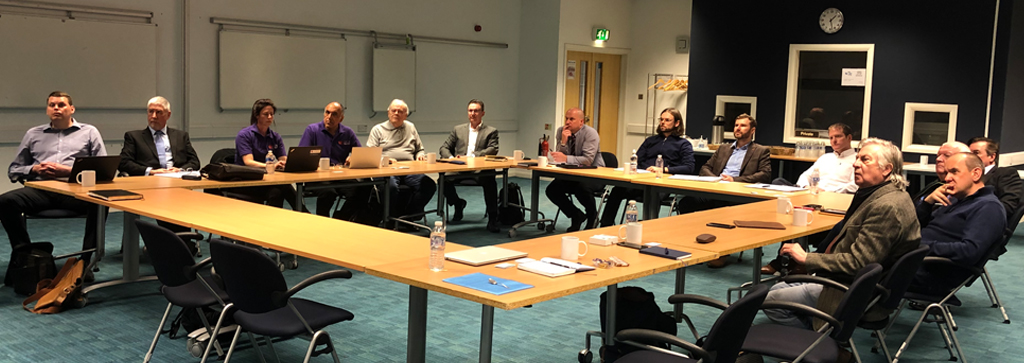Fruitful exchange in two events
If you think about Wales, the manufacturing industry may not be the first thing that comes to your mind. Yet, EIT Manufacturing was invited to Wales to present the organisation there – so Dr Christian Bölling and Dr Wolfgang Kniejski from the Darmstadt hub of EIT Manufacturing happily went over. They share their experiences in an interview.
Tell us about the occasion you were invited for.
Mr Bölling: The Department of Economy, Skills and Natural Resources of the Welsh Government invited us to present the services EIT Manufacturing has to offer in two info events, one in near Cardiff, the other in North Wales at the AMRC, a part of the University of Sheffield Advanced Manufacturing Research Centre. The audience in the first event consisted of small and medium-sized enterprises, for the second event, we met with networks from Wales.

Represenatatives of small and medium-sized companies attended the event near Cardiff.
How did the invitation come about?
Mr Kniejski: At the end of last year, one of our supported start-up companies, NightingaleHQ, suggested a meeting with Iain Willox, Head of High Value Manufacturing at the Industrial Transformation Division in the Department of Economy, Skills and Natural Resources, with the goal to talk to the innovation team, the entrepreneurship team and the industry Wales senior management team.
The intention was that following this online discussion, Christian and I would go to Wales to speak with representatives of industry and other organisations who were interested in hearing more. This led to our visit in Wales and to the two information events.
Why was EITM chosen for the presentation?
Mr Bölling: Welsh organisations are currently looking for new ways to boost innovation and support start-ups in Wales. Brexit has, for the moment, cut Wales off from European funding. At present, the agreements to continue the participation of the United Kingdom in EU-funded projects has not been completed and many EU-funded projects are coming to an end.
EIT Manufacturing offers access to a pan-European community of actors from the manufacturing industry. In addition, we provide services to start-ups, scale-ups and small and medium sized companies with which they can boost innovation, but which don’t necessarily involve EU funding.
What did you learn?
Mr Bölling: From my perspective, learning about the Welsh manufacturing industry has just begun. We are following up with a number of companies and learn about their specific needs in the process. But I noticed a similarity between Wales and other countries: Companies would like to move forward, explore new countries, but are hesitant, because this is a move outside of their comfort zone. This is where we can help.
Can you tell us about the Welsh start-up scene and manufacturing industry?
Mr Kniejski: The activity of manufacturing companies in Wales is of considerable economic, social and ecological importance. A major challenge for these companies is to gain access to research capacity, outstanding minds and adequate training. Therefore, also companies in the Welsh manufacturing industry, established corporations, mid-cap companies or small and medium-sized companies are looking for innovative solutions to stay competitive.
In addition, there are very innovative technology-oriented start-ups, especially in the fields of AI, mixed reality, robotics and automation. They offer innovative solutions for manufacturing companies and are looking for the right partners to implement their ideas and solutions. This is the right environment for us to step in, to offer business development support and to support transformation processes to Industry 4.0.
What is you take-away from the events?
Mr Kniejski: It was a pleasure to meet you many different stakeholders from the manufacturing sector in both events. We appreciated the very active interaction with us in both events to obtain a better understanding of the remit of EIT Manufacturing and the other Knowledge and Innovation Communities of EIT more generally. Although the event in North Wales was not equivalent to the South Wales session in terms of numbers of attendees, the informal format did facilitate useful discussions with stakeholders from industry, academia and government.
What surprised you most?
Mr Kniejski: I really appreciated that the events instigated very useful discussions on networking and collaboration opportunities for Welsh organisations and I was personally very positively surprised by the immediate follow-up activities initiated directly after both events. I came away with the strong believe that we as EIT Manufactuirng will increase interaction in Wales leading to implement fruitful actions and impact.

